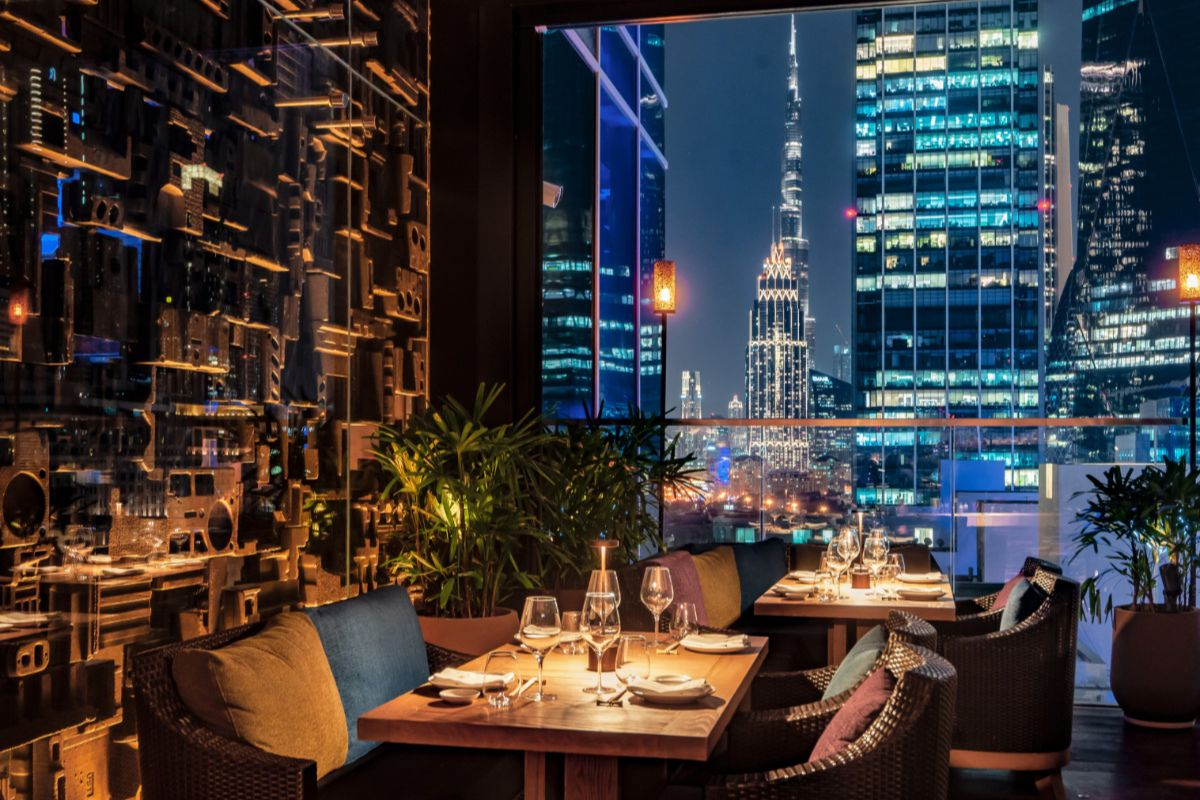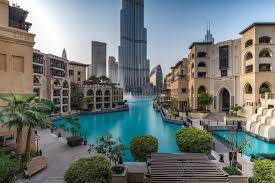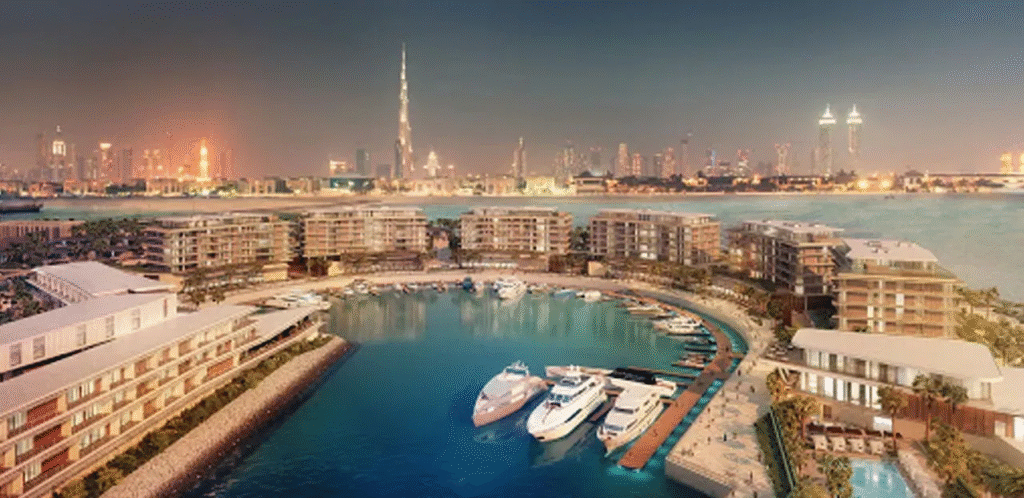
Imagine savoring a Michelin-star meal on a rooftop overlooking the glittering Burj Khalifa, then retreating to your elegant villa or penthouse, where luxury and investment potential intertwine. In 2025, Dubai’s real estate market is soaring, with 96,000 transactions worth $87 billion in the first half, 58% driven by buyers from the UK, India, Russia, and China. High-End Dining, Neighborhoods like Downtown Dubai, Palm Jumeirah, Emirates Hills, and Bluewaters Island offer 100% freehold ownership, a dirham pegged to the U.S. dollar, and no personal income tax, capital gains tax, or annual property taxes.
With 6-9% rental yields and 7-15% price appreciation, these areas outshine London (2-4%) and New York (2-3%). Properties over $545,000 qualify for a 10-year Golden Visa, while smaller units grant 2-year residency. Fueled by 25 million tourists and a 4% population surge, these neighborhoods blend high-end dining, opulent living, and strong returns. Navigating fees, VAT, and 2025 regulations is key to securing your place in Dubai’s elite enclaves.
Located 15-40 minutes from Dubai International Airport via Sheikh Zayed Road, metro, or water taxis, these neighborhoods offer villas, penthouses, and apartments with vacancy rates of 2-3%, compared to 7-10% globally. You keep 100% of rental income $36,000-$150,000 annually on $600,000-$5 million properties versus $19,800-$90,000 elsewhere after taxes.
Zero capital gains tax saves $24,000-$300,000 on $120,000-$1.5 million profits, and no property taxes save $6,000-$50,000 yearly, unlike London’s council tax (up to 2%) or New York’s property tax (1-2%). Residential purchases skip 5% VAT ($30,000-$250,000), and the Golden Visa adds residency value. With Michelin-star restaurants, private beaches, and proximity to landmarks like Dubai Mall, these neighborhoods deliver 7-15% price growth, offering a lifestyle of grandeur and investment potential.
Living here feels like stepping into a world of effortless elegance.
These neighborhoods impose no personal income tax, letting you keep every dirham, unlike the U.S. (up to 37%) or UK (up to 45%). A $600,000 Downtown Dubai apartment yields $36,000-$54,000, saving $13,320-$24,300; a $5 million Palm Jumeirah villa yields $120,000-$150,000, saving $54,000-$67,500.
Short-term rentals, driven by 25 million tourists dining at venues like Nobu or Zuma, require a DTCM license ($408-$816), boosting yields by 10-20% ($3,600-$30,000). Long-term leases, popular with affluent residents, need Ejari registration ($54-$136) for stability. Non-compliance risks fines up to $13,612, so licensing is essential. Smart home systems and AI-driven pricing tools maximize profits in these high-demand areas.
Tax-free rentals feel like a monthly wave of prosperity.
These properties offer zero capital gains tax, letting you keep 100% of sale profits. Selling a $600,000 Bluewaters apartment for $720,000 (20% appreciation) yields a $120,000 tax-free profit, saving $24,000-$33,600 versus London (20-28%) or New York (20-37%). A $5 million Emirates Hills villa sold for $6.25 million delivers a $1.25 million tax-free gain, saving $250,000-$350,000. Price growth varies: 10-15% in Palm Jumeirah, 7-12% in Downtown Dubai and Bluewaters. A 4% DLD fee ($24,000-$200,000), often split, applies, but tax-free profits make these neighborhoods wealth-building havens.
Keeping every dirham feels like a financial triumph.
Unlike global markets, these neighborhoods have no annual property taxes, saving $6,000-$50,000 yearly on $600,000-$5 million properties versus London’s council tax ($12,000-$100,000) or New York’s property tax (1-2%). Maintenance fees range from $8,000-$25,000, covering amenities like private pools, rooftop terraces, and concierge services, competitive with global luxury markets. A 5% municipality fee on rentals ($1,800-$7,500) applies, reasonable for elite locations. These costs make ownership sustainable, supporting a lifestyle of high-end dining and luxury.
No property taxes feel like a warm embrace for your investment.
Residential purchases skip 5% VAT, saving $30,000-$250,000 on $600,000-$5 million properties, unlike commercial properties or the UK’s stamp duty (up to 12%, or $72,000-$600,000). Off-plan purchases, common in Downtown Dubai, incur 5% VAT on developer fees ($6,000-$100,000), recoverable via Federal Tax Authority (FTA) registration ($500-$1,000). Short-term rental operators must register for VAT if revenue exceeds $102,041, charging 5% but claiming credits on DTCM fees ($408-$816). A $600,000 apartment yielding $36,000-$54,000 incurs $1,800-$2,700 in VAT, with $600-$1,200 in credits; a $5 million villa yielding $120,000-$150,000 incurs $6,000-$7,500 in VAT, with $2,000-$3,000 in credits. Non-compliance risks fines up to $13,612, so meticulous records are crucial.
VAT exemptions feel like a clever lift for your profits.
The 4% DLD fee, typically split, applies: $24,000 for a $600,000 apartment or $200,000 for a $5 million villa. Gift transfers to family or shareholders reduce DLD to 0.125%, saving $23,250-$193,750. For example, gifting a $5 million villa cuts DLD from $200,000 to $6,250. Title deed issuance costs $136-$272, requiring DLD registration. Broker fees, typically 2% ($12,000-$100,000), may be waived for off-plan projects like Burj Al Arab Views. Mortgage registration (0.25% of the loan, or $1,500-$12,500) and valuation fees ($680-$1,360) apply for financed deals. The 2025 Oqood system ensures escrow compliance for off-plan purchases, protecting your investment.
Title deeds feel like the key to your opulent sanctuary.
The 9% corporate tax, introduced in 2023, applies to businesses with profits over $102,110. A company leasing a $600,000 apartment yielding $36,000-$54,000 faces a 9% tax ($3,240-$4,860), reducing net income to $32,760-$49,140. A $5 million villa yielding $120,000-$150,000 incurs $10,800-$13,500 in tax. Qualified Free Zone Person (QFZP) status in areas like Dubai Multi Commodities Centre (DMCC) avoids this, saving $6,120-$36,000, with setup costs of $2,000-$5,000. Small business relief waives corporate tax for revenues under $816,000 until December 31, 2026. Individual ownership skips this tax, ideal for most buyers.
Corporate tax feels like a wave you can easily navigate.
The Domestic Minimum Top-up Tax (DMTT), effective January 1, 2025, imposes a 15% tax on multinationals with revenues over €750 million ($793 million). Individual investors and smaller entities are unaffected, and QFZP status avoids DMTT, saving $6,120-$36,000. Cabinet Decision No. 34 refines Qualifying Investment Fund (QIF) rules, exempting corporate tax if real estate income is below 10%. A QIF earning $1 million, with $100,000 from rentals, faces 9% tax ($8,100) on 90% ($900,000). A July 2025 policy allows corporate tax deductions on fair market value depreciation, saving $1,818-$9,000 annually for a $1 million property revalued at $1.25 million.
New rules feel like a puzzle with prosperous solutions.

Burj Al Arab Views ($700,000-$4 million) offers apartments with 6-9% yields and 8-12% price growth, near Michelin-star restaurants like IDAM by Alain Ducasse. A $700,000 apartment yields $42,000-$63,000 tax-free, saving $15,540-$28,350. Selling for $840,000 yields a $140,000 tax-free profit, saving $28,000-$39,200. No property taxes save $7,000-$40,000, and VAT exemption saves $35,000. Maintenance fees are $8,000-$20,000, with a 5% municipality fee ($2,100-$3,150). QFZP saves $6,120-$36,000. U.S. investors deduct depreciation ($12,727-$72,727), saving up to $25,455. Its proximity to Dubai Mall and Burj Khalifa draws affluent buyers.
Burj Al Arab Views feels like urban grandeur.
Atlantis The Royal Residences ($600,000-$5 million) offer villas and apartments with 6-9% yields and 10-15% price growth, featuring dining by Michelin-starred chefs like Heston Blumenthal. A $600,000 apartment yields $36,000-$54,000 tax-free, saving $13,320-$24,300. Selling for $750,000 yields a $150,000 tax-free profit, saving $30,000-$42,000. No property taxes save $6,000-$50,000, and VAT exemption saves $30,000. Maintenance fees are $8,000-$25,000, with a 5% municipality fee ($1,800-$2,700). QFZP saves $6,120-$36,000. U.S. investors deduct depreciation ($10,909-$90,909), saving up to $31,818. Its beachfront dining attracts global elites.
Atlantis The Royal feels like a coastal culinary palace.
Emirates Hills ($1 million-$5 million) offers villas with 6-8% yields and 7-10% price growth, near fine dining venues like The Maine. A $1 million villa yields $60,000-$80,000 tax-free, saving $22,200-$36,000. Selling for $1.2 million yields a $200,000 tax-free profit, saving $40,000-$56,000. No property taxes save $10,000-$50,000, and VAT exemption saves $50,000. Maintenance fees are $10,000-$25,000, with a 5% municipality fee ($3,000-$4,000). QFZP saves $6,120-$36,000. U.S. investors deduct depreciation ($18,182-$90,909), saving up to $31,818. Its gated exclusivity draws high-net-worth buyers.
Emirates Hills feels like a regal dining estate.
Bluewaters Residences ($600,000-$3 million) offer apartments with 7-9% yields and 8-12% price growth, near dining hotspots like Hell’s Kitchen. A $600,000 apartment yields $36,000-$54,000 tax-free, saving $13,320-$24,300. Selling for $720,000 yields a $120,000 tax-free profit, saving $24,000-$33,600. No property taxes save $6,000-$30,000, and VAT exemption saves $30,000. Maintenance fees are $8,000-$20,000, with a 5% municipality fee ($1,800-$2,700). QFZP saves $6,120-$36,000. U.S. investors deduct depreciation ($10,909-$54,545), saving up to $19,091. Its island dining vibe attracts tourists.
Bluewaters Residences feels like a glamorous culinary escape.
Price Range: Bluewaters Residences ($600,000-$3 million) suit mid-range luxury; others ($700,000-$5 million) target ultra-premium buyers.
Rental Yields: 6-9%, with Bluewaters at 7-9% for short-term rentals (10-20%, $3,600-$13,500); others at 6-8% for stable leases.
Price Appreciation: 7-15%, with Palm Jumeirah at 10-15%, others at 7-12%.
Lifestyle: Michelin-star dining and opulent homes create elite living.
Amenities: Burj Khalifa, Ain Dubai, and top restaurants enhance appeal.
ROI Verdict: 8-12% ROI, blending gourmet luxury with strong returns.
Living here feels like embracing a prestigious culinary legacy.

For individuals: Hold properties personally to avoid corporate taxes, saving $6,120-$36,000. Negotiate DLD fee splits, saving $12,000-$100,000. Use gift transfers to reduce DLD to 0.125%, saving $23,250-$193,750. Recover 5% VAT on developer fees via FTA registration ($500-$1,000). Leverage double taxation treaties with 130+ countries, saving $13,320-$67,500. U.S. investors deduct depreciation ($10,909-$90,909), saving up to $31,818. For corporates: Secure QFZP status, keep QIF income below 10%, and claim depreciation deductions. Hire property managers ($8,000-$25,000 annually) and tax professionals ($1,000-$3,000) to avoid fines up to $136,125. Focus on short-term rentals in Bluewaters, long-term in Emirates Hills.
These strategies feel like a roadmap to your gourmet riches.
A projected oversupply of 182,000 units by 2026 may slightly slow price growth in newer areas, but established neighborhoods like Palm Jumeirah and Downtown Dubai remain resilient. Off-plan delays risk setbacks, so choose trusted developers like Emaar or Nakheel and verify escrow compliance via the 2025 Oqood system. Non-compliance with VAT or DTCM rules risks fines up to $13,612, and corporate tax errors can cost $136,125. Indian investors must report properties in India’s Foreign Asset schedule to avoid $135,000 penalties. Currency fluctuations, like a 5% dirham shift, could impact returns.
From Downtown Dubai’s rooftop dining to Palm Jumeirah’s beachfront elegance, these neighborhoods offer 8-12% ROI, 7-15% growth, and tax-free savings of $6,000-$300,000 annually. With Golden Visa perks, 80-85% rental occupancy, and a lifestyle of high-end dining and luxury, they’re a top choice for elite investors. Navigate fees, choose your neighborhood, and invest in Dubai’s opulent future in 2025.
read more: Downtown Dubai Apartments Offering the Ultimate Urban Lifestyle
